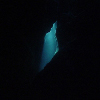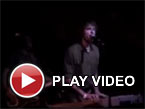Balam Acab, "Wander/Wonder"

This is Alec Koone's full-length debut and it is a feverishly anticipated one in many circles, as his 2010 EP (See Birds) boasted some pretty spectacular moments.  Wander/Wonder thankfully keeps most of elements that I love about Balam Acab's languorous, spectral soul intact, but takes a large leap forward in sophistication and ambitionl– in fact, quite a few people are already hailing it as one the year's best albums.  There are a couple of things that keep me from making that claim myself, but there is no denying that Koone is a goddamn wizard at what he does.
See Birds was the first physical release on Tri-Angle, the label run by 20 Jazz Funk Greats' Robin Carolan, marking the beginning of a very distinctive and wildly successful aesthetic: sexy and damaged-sounding slow-motion soul.  In fact, one of Koone's songs even wound up in a L'Oreal commercial starring Beyoncé– a truly surreal and improbable feat for a teenager on an underground label.
In a broad sense, Koone's work shares quite a bit of common ground with his labelmates oOoOO and Holy Other, as his songs are crafted from chopped-up and pitch-shifted vocal hooks and simple, languid beats.  Balam Acab has a much more boldly experimental streak than the rest of the Tri-Angle roster though.  For example, despite all of See Bird's sultry beats and beautifully fragile hooks, Koone never let a song go by without something warped or ingeniously anachronistic threatening to drag it all forcibly into far weirder, more abstract territory.  Such tactics would have been jarring and self-defeating in lesser hands, but Koone somehow always knew exactly how far he could push things without losing control.  In many ways, Wander/Wonder takes these skewed tendencies much further.  Unfortunately, Balam Acab lost some of its sharper textural edges in the process.
To put it bluntly: Koone is a bit water-obsessed.  Most of these eight songs feature very prominent burbling, gurgling, and dripping water sounds and absolutely everything sounds either submerged or amniotic (so much so that The Wire wryly described Koone's new direction as "womb-hop").  For example, the dripping and rippling sounds in "Fragile Hope" are so loud that they grab as much focus as the actual music.  This curious artistic decision is a mixed success, as it makes the entire album feel like a coherent, thematically linked suite and adds greatly to the dreamlike, post-coital feel of the music, but it is also a bit over-the-top and hackneyed.  Another curious quirk here is that Alec loves to pitch-shift vocals upwards to make them sound angelic or childlike (most of his peers go the other direction, opting to slow down and stretch vocals eerily).  I will grudgingly concede that the "sexy chipmunk" vocals succeed in making the songs feel endearingly innocent and vulnerable, but Koone comes uncomfortable close to sounding precious on several occasions.
In theory, this is exactly the sort of album that I would normally loathe: it relies very heavily on a hugely overused motif (water), lacks the grittier and more exotic touches of its predecessor, has some beats that fix it very much at this specific point in time, and is very intent on sounding "pretty."  Yet despite all those damning characteristics, I still find Wander/Wander extremely absorbing and likeable– Koone is simply that absurdly good at what he does. For all its comparative toothlessness, it is absolutely teeming with haunting vocal hooks and multiple layers of textured and hallucinatory strangeness in the periphery.  I was also struck by the sheer nakedness and simplicity of the melodies, as some pieces are little more than a single ghostly, melancholy voice amidst some hissing, crackling, and rippling, but they nevertheless manage to hold my attention completely.  It is not a stunning epiphany to say that strong motifs can stand on their own and don't need any added density to prop them up, but it is extremely rare for a "pop" album to be this daringly spare.
Finally, Alec is pretty ballsy in both avoiding the successful formula that put him on the map and in circumventing normal song structure.  He has essentially gone from writing nothing but potential singles to writing almost no potential singles at all.  There are a few grooves and beats here and there, but the bulk of the album drifts along with a dream-like logic, its melodies seamlessly emerging from or sinking into gently burbling pools of field recorded ambiance.  If Koone ever gets any softer than this, I am definitely out, but for now I am very much an admirer.  There are certainly some dubious individual moments strewn throughout this album, but they are all ultimately in service of a beguilingly warm and inspired whole.
Samples:
 
 



